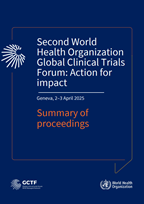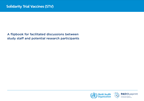Clinical trials
Clinical trials are a type of research that studies new tests and treatments and evaluates their effects on human health outcomes. People volunteer to take part in clinical trials to test medical interventions including drugs, cells and other biological products, surgical procedures, radiological procedures, devices, behavioural treatments and preventive care.
Clinical trials are carefully designed, reviewed and completed, and need to be approved before they can start. People of all ages can take part in clinical trials, including children.
There are 4 phases of biomedical clinical trials:
- Phase I studies usually test new drugs for the first time in a small group of people to evaluate a safe dosage range and identify side effects.
- Phase II studies test treatments that have been found to be safe in phase I but now need a larger group of human subjects to monitor for any adverse effects.
- Phase III studies are conducted on larger populations and in different regions and countries, and are often the step right before a new treatment is approved.
- Phase IV studies take place after country approval and there is a need for further testing in a wide population over a longer timeframe.
Clinical trials usually involve participants from more than one medical or research institution, and often more than one country. As each country has its own requirements for clinical trials research it is possible that single trials could be included on more than one registry, and hence appear on more than one registry database. However, data on various clinical trial registries varies.
WHO’s International Clinical Trials Registry Platform (ICTRP) links clinical trials registers globally in order to ensure a single point of access and the unambiguous identification of trials with a view to enhancing access to information by patients, families, patient groups and others.
The ICTRP is a global initiative that aims to make information about all clinical trials involving humans publicly available. It also aims to:
- improve the comprehensiveness, completeness and accuracy of registered clinical trial data;
- communicate and raise awareness of the need to register clinical trials;
- ensure the accessibility of registered data;
- build capacity for clinical trial registration;
- encourage the utilization of registered data; and
- ensure the sustainability of the ICTRP.
Beyond the ICTRP, WHO also leads efforts to strengthen the broader clinical trials ecosystem. In May 2022, the World Health Assembly adopted resolution WHA75.8 on strengthening clinical trials. This resolution emphasizes the critical role of well-designed, ethically guided, and scientifically robust clinical trials in generating the high-quality evidence needed to inform public health policies and interventions.
The resolution calls for:
- Stronger global collaboration in clinical research, including support for multi-country trials and rapid coordination during public health emergencies;
- Equity and ethics, with a focus on inclusive participation and addressing the needs of under-represented populations; and
- Enhanced capabilities, particularly in low- and middle-income countries, to meet international standards for trial quality and transparency.
As part of its response, WHO has developed the Guidance for Best Practices for Clinical Trials and a Global Action Plan for Clinical Trial Ecosystem Strengthening, which together provide practical recommendations and pathways for all stakeholders including Member States, regulators, researchers, funders and partners to implement WHA75.8.
These initiatives complement the ICTRP by ensuring that, in addition to being visible and accessible, clinical trials are also ethical, equitable, collaborative, and of high quality, so that the evidence they generate can be trusted and used globally.





